Herbert Goldstein (1922-2005)
Professor Emeritus of Nuclear Science and Engineering and Former Thomas Alva Edison Professor of Applied Physics
 Herbert Goldstein, long recognized for his scholarship in classical mechanics and reactor shielding, was the author of the graduate textbook, Classical Mechanics. The book has been a standard text since it first appeared 50 years ago and has been translated into nine languages. Goldstein's contributions to nuclear energy were honored by the U.S. Department of Energy, which awarded him the E.O. Lawrence Memorial Award in 1962. In 1977, he was the recipient of the Distinguished Service Award from the shielding division of the American Nuclear Society.
Herbert Goldstein, long recognized for his scholarship in classical mechanics and reactor shielding, was the author of the graduate textbook, Classical Mechanics. The book has been a standard text since it first appeared 50 years ago and has been translated into nine languages. Goldstein's contributions to nuclear energy were honored by the U.S. Department of Energy, which awarded him the E.O. Lawrence Memorial Award in 1962. In 1977, he was the recipient of the Distinguished Service Award from the shielding division of the American Nuclear Society.
Goldstein was a professor of nuclear science and engineering at the Fu Foundation School of Engineering and Applied Science since 1961. He received the Great Teacher Award, given by the Society of Columbia Graduates, in 1976. In 1984, Goldstein was the first to hold the Thomas Alva Edison Professorship at the University.
In addition to research, Goldstein devoted time to promoting scientific literacy by teaching undergraduate courses. In 1977, he taught a course he designed to increase scientific understanding of energy issues - "Nuclear Energy: A Semi-technical View for the Non-scientist." He was also one of the faculty members instrumental in developing an innovative science course for non-scientists, "The Theory and Practice of Science," at the College.
Goldstein was a consultant for Oak Ridge National Laboratory and Brookhaven National Laboratory. He was a fellow of the American Physical Society, the American Nuclear Society, the New York Academy of Sciences and the American Association for the Advancement of Science. Goldstein also was a member of the American Association of Physics Teachers and was a founding member and president of the Association of Orthodox Jewish Scientists. He received a B.S. from City College of New York in 1940 and a Ph.D. from Massachusetts Institute of Technology in 1943.
Education
B.S. City College of New York, 1940
Ph.D. M.I.T., 1943
Select Publications
The Scientific Experience, H. Goldstein, J.L. Gross, R.E. Pollack and R.B. Blumberg, Columbia University, 1996.
Classical Mechanics, revised second edition, Addison-Wesley, 1981.
Research Statement
From 1995
"For some time now my research interests in the nuclear field have centered on the ways in which the characteristics of the microscopic neutron cross sections affect the macroscopic transport of neutrons through large materials bodies. In such theoretical studies, one must be sure that the methods of calculating the gross transport of neutrons represent accurate descriptions of what takes place in nature, and that these methods sensitively reflect the properties of the microscopic cross section. Hence, much of my research, and that of my thesis students, has been oriented to developing and refining caculational methods that give "gold-standard" results for neutron calculations. They represent the most advanced, detailed, and accurate transport calculations for the present state-of-the-art of numerical computation, although the methods are usually, but not always, too detailed and complex for routine engineering calculations. Transport methods that have come out of these researches include techniques for including point-energy descriptions of rapidly fluctuating cross sections, and analytic rigorous methods for transport with slowing down when the cross sections are constant in energy. Microscopic cross sections whose effects have been investigated include the so-called anti-resonance dips in the cross sections and the distributions of secondary neutrons from inelestic scattering.
In recent years, the knowledge and experience gained from these researches has been applied to more practical nuclear engineering problems, particularly to the long-term neutron irradiation of reactor pressure vessels and the consequent effect on the embrittlement of the metal. We have been in the process of developing software to facilitate more realistic discrete ordinate calculations in complex studies of the reactor and its surroundings out through the pressure vessel. We are also performing Monte Carlo studies of detailed surveillance capsule geometries to better understand modeling errors associated with discrete ordinate calculations in such complex reactor systems. These projects are being conducted in collaboration with Public Service Electric and Gas Research Corporation and Consolidated Edison of New York.
In addition, I am continuing to pursue my interests in classical mechanics and broader energy and scientific issues. While serving as Columbia's Thomas Alva Edison Professor from 1984-1986, I gave a series of lectures on nuclear energy issues. My involvement in developing an undergraduate course "The Theory and Practice of Science", with colleagues from other science disciplines has resulted in a textbook The Scientific Experience".
